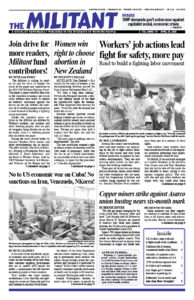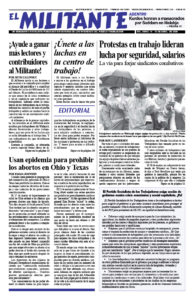April 17, 1995
A wave of class outrage swept the Philippines in response to the execution of Flor Contemplacion, a Filipino maid hanged to death by the government of Singapore March 17. The Philippines is the world’s largest exporter of human labor.
Contemplacion had been framed for the 1991 deaths of another Filipino maid and a four-year-old Singaporean boy. Contemplacion’s funeral turned into an angry demonstration against the execution and Manila’s indifference to the plight of millions of migrant workers.
“More than 40 percent of Filipinos are either unemployed or underemployed,” said Amante Jimenez, chairperson of the League of Filipino Students. Jimenez reported that 30,000 people daily attended Contemplacion’s wake, with more than 50,000 turning out for the funeral.
April 17, 1970
Significant developments are occurring as Washington presses its efforts to establish a permanent, stable power base in Indochina. The most ominous are moves leading toward direct U.S. troop involvement in Laos and Cambodia.
The steps have sharpened rifts among those sections of the ruling class who are fearful that U.S. imperialism may be overreaching itself in Vietnam. These circles are particularly fearful that a new escalation could detonate a massive new explosion of antiwar sentiment at home.
The crisis of the U.S. puppet regime in Saigon was given added dimension in recent days as university students struck in behalf of their political freedom, and disabled South Vietnamese war veterans demanded relief from their miserable existence, battling Saigon cops and troops with bricks, pipes and hammers.
April 14, 1945
[During the war] the nation’s fighting soft-coal miners weren’t fooling when they voted two weeks ago by an eight to one majority to authorize strike action if they didn’t obtain an acceptable contract. Following termination of their old contract and despite a 30-day extension, an estimated 100,000 miners in some 300 mines throughout eight states engaged in spontaneous strike actions.
With 200 mines closed, the operators announced that a “tentative agreement” had been reached with the UMW.
The WLB [War Labor Board] intervened to declare that it has certified the mine dispute to Roosevelt, recommending “seizure” of the 200 closed mines. During the strikes two years ago, such “seizures” meant making the mine operators government officials and running the mines still under their control.

